Brandon Stanton's Blog, page 104
October 17, 2018
(2/4) “There had always been permission to kill any Tutsis we...
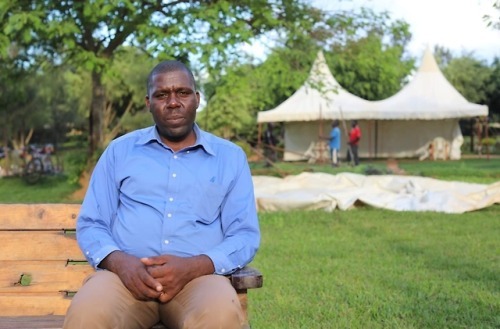
(2/4) “There had always been permission to kill any Tutsis we discovered while on patrol. But on April 6th our instructions became very clear: every Tutsi was to be found and killed. It was even said over the radio. Our first official order was to drive to a nearby city and open fire on unarmed civilians. Most soldiers carried out the orders with glee. The hatred had sunk into their core. Let it be remembered that the killings were pursued with pride, passion, and determination. Soldiers fired indiscriminately at people walking down the road. I pretended to participate, but I didn’t pull the trigger. That night we returned to the camp and everyone swapped stories. They bragged about how many people they’d killed. It became a competition. Soldiers would radio from other bases, and say: ‘We’ve killed so many already. Why can’t you keep up?’ All of it was sickening. I couldn’t eat for weeks. But it was most traumatizing for the Tutsi soldiers in our army. My roommate was a Tutsi. He had to pretend like he was enjoying the murder of his friends and family. He had to laugh along with the others to save his own life. He could only remove his mask with me. And he was the only one that I trusted with my plan.”
(Kigali, Rwanda)
(¼) “When I was twelve years old, they undressed a...
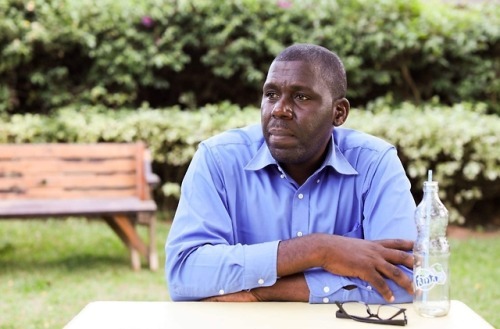
(¼) “When I was twelve years old, they undressed a Tutsi girl in front of my entire school. They wanted to see if her private parts were the same as other people. She kept trying to cover herself with her hands while they pulled out her hairs one by one. I can still hear the laughter. Even with all the violence that came later, that was the most traumatic moment of my life. It’s still the image I see when I’m trying to fall asleep. The genocide didn’t begin until many years later, when I was twenty-five years old. I was a soldier in the army. I could tell the atmosphere was growing more and more tense. Our commanders were openly using ethnic slurs. There was talk of ‘wiping our enemies from this country.’ One night I was assigned to guard four Tutsi prisoners. They’d been accused of making explosives but were clearly innocent civilians. They’d been tortured. Their wounds were rotten and stinking. A major came to the cell at 1AM and ordered me to step aside. ‘These people need to be killed immediately,’ he said. But I refused. I told him those were not my instructions. He pushed and screamed, but eventually he stormed off. The prisoners were released a few days later, but someone followed them out and killed them. It was a sign of things to come.”
(Kigali, Rwanda)
October 16, 2018
(4/4) “We didn’t lose a single person. After hiding out for...
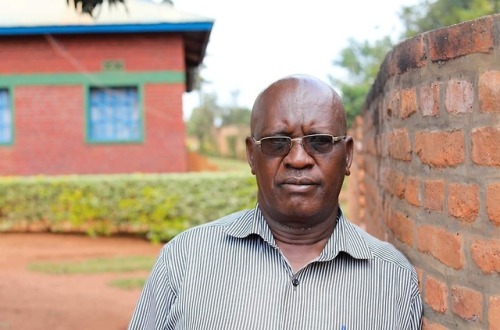
(4/4) “We didn’t lose a single person. After hiding out for three weeks, we were rescued by the Rwandan Patriotic Front. Everyone came running in from the fields. All of us were cheering. In the end, over three hundred people survived the genocide by hiding in this church. I can’t remember all their faces. Life has taken us to many different corners. And some of them have left the country to begin new lives. But many of them still call me father. I’ve given away the bride in several different wedding ceremonies. Occasionally people will randomly show up on my doorstep with drinks. I’ll say to them: ‘You were with us in the church, weren’t you?’ And we’ll embrace. When I look back, I believe the genocide could have been stopped if more pastors had taken a stand. We were the ones with influence. The killers belonged to our congregations. And we could have held them back. But instead we did nothing. And every pastor had a different excuse. Some said they didn’t know things would get so bad. Some said they were too afraid. And some said the government was too powerful to oppose. But when you’re standing aside while people die, every excuse is a lame one.”
(Kigali, Rwanda)
(¾) “The next time the killers came, there were fifty...
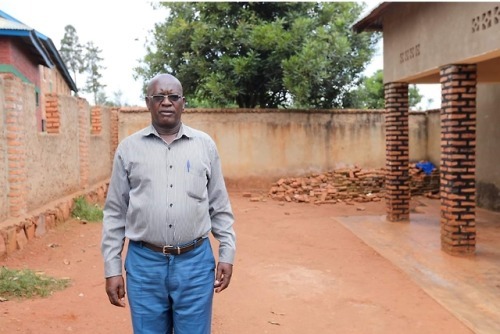
(¾) “The next time the killers came, there were fifty of them. All of them had guns or machetes. They pushed straight past me and entered the pastor’s residence. They began pulling people out of the ceiling. They were kicking us and dragging us along the floor. I knew this was the end. I could see our death clearly. Some people were shivering and wailing and screaming for mercy. Others were completely silent. They’d already lost so many loved ones and they were ready to die themselves. We were dragged to this very spot and put in three lines. We began to say our last prayers. I scanned the mob of killers for recognizable faces. Many of them were Christians. Some were even from my congregation. Every time I recognized a face, I called to him by name. I said: ‘When I die, I am going to heaven. Where will you go?’ Then I pointed to the next man, and asked him the same question. Then the next. Then the next. Some of the killers grew nervous. They began to argue amongst themselves. Nobody wanted to be the first to kill. Soon they were threatening to shoot each other. And they began to leave, one by one, until all of them had run off.”
(Kigali, Rwanda)
(2/4) “We filled every hiding place with a person. Some were in...
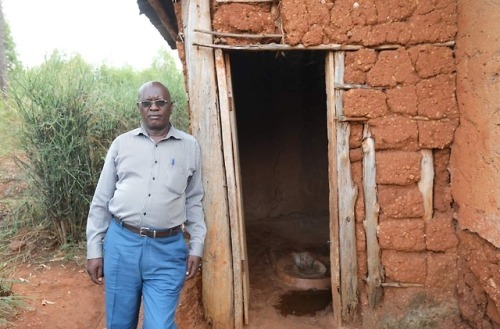
(2/4) “We filled every hiding place with a person. Some were in the ceiling. Some were in the cupboards. Some were under the floor. There were even two people in this toilet. That very first evening the militia came to my front gate. Some were carrying guns. Others were carrying machetes. They’d been told that I was hiding people. They demanded to come inside and search the property. I stood in the doorway and told them that they’d have to kill me first. ‘We’ll be back,’ they said. ‘And thanks for gathering the cockroaches into one place. Because it will be easier to kill them here.’ Days passed by. We were an abandoned, dying group. Our food ran out quickly. Thankfully some church members answered my call, and agreed to sneak us food after dark. The nights were the worst. We could hear gunfire and screaming in the surrounding hills. Always we thought we were next. Nobody was sleeping. My wife and I lost so much weight. All our friends abandoned us. They pretended not to know us. Only one pastor stood by our side. He came to me one night and warned me that there was a plan to attack the church. I told the news to my wife, and we both agreed that we were ready to die.”
(Kigali, Rwanda)
(¼) “First came the meetings. They were openly...
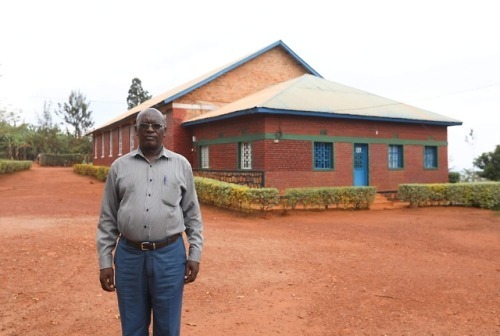
(¼) “First came the meetings. They were openly advertised on community microphones. Their stated purpose was to discuss ‘current issues,’ but everyone knew that killings were being organized. These things were being openly discussed on the radio at the time. I was always invited to these meetings, but I never attended. I was a pastor. I wanted no part in those discussions. But when the killings finally commenced on April 7th, people came running to my church for sanctuary. The first of them arrived early in the morning. They were trembling and too scared to speak. All they could say was: ‘Hide us, hide us.’ I told everyone to go inside the church. I said: ‘If our God is true, we will be OK.’ Finally a young man arrived who was able to talk. ‘They killed my parents,’ he said. ‘All of us are being hunted.’ I was also terrified but I tried not to show it. I just kept bringing people inside the gate. By the time the sun went down, there were over three hundred people hiding on this property.”
(Kigali, Rwanda)
On April 6th 1994, an airplane carrying the President of...
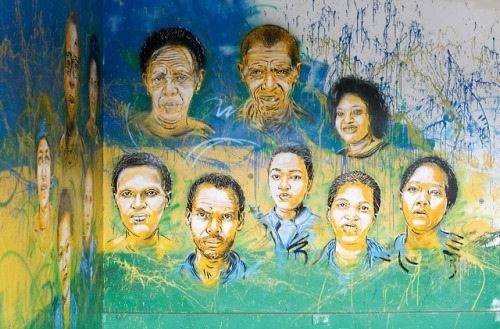
On April 6th 1994, an airplane carrying the President of Rwanda was shot down over the capital city of Kigali, serving as a catalyst for genocide against the minority Tutsi population. One million people were killed over the next 100 days. It was one of the most violent episodes in human history. The stories from that time can be traumatizing to hear. Living through them is nearly unimaginable. But in the wake of this tragedy, an equally unlikely story has unfolded. It is the story of Rwanda’s recovery and reconciliation. Rwanda has become one of Africa’s model economies. Its streets are clean and safe. Over one million tourists visit each year. If you walk through Kigali today, it’s difficult to imagine the events that occurred less than twenty-five years ago. But the stories are still there. And you can’t listen to them without being reminded of humanity’s capacity for violence and the fragility of peace. During my week in Rwanda, I focused on the stories of people who took a moral stand during the genocide. These are members of the Hutu majority who risked their lives to shield and protect Tutsis. In Rwanda they are known as ‘The Rescuers.’ Over the next several days, I will be sharing their stories.
October 15, 2018
“I thought it was a prank. I was only twenty years old. It...
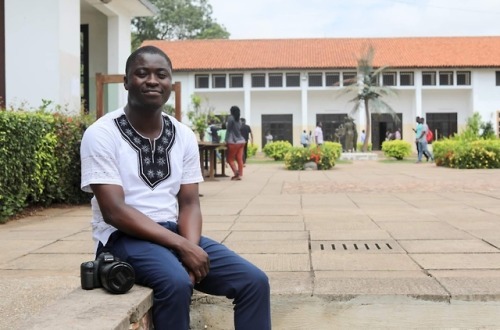
“I thought it was a prank. I was only twenty years old. It was the first time we’d ever had sex. We discussed ending the pregnancy but I begged her to consider keeping it. Both of our families were supportive. I promised that I would provide. And once we decided to keep the child, I started earning money however I could. I learned to print t-shirts and do graphic design. I sold my phone to buy a camera. My mother even took out a loan to help me buy it. There was no photography school in this country, so I had to learn everything myself. I took so many pictures of my daughter growing up. My mother would sit for lighting practice. I watched YouTube videos. I watched every single class on Creative Live. Finally I got good enough that someone hired me to take pictures of their party. Then I moved on to weddings and corporate events. Now my dream is to become a documentary photographer. There are so many stories to tell in this country, but very few outlets will publish them. That hasn’t stopped me though. I’ve photographed a slaughterhouse with horrible conditions. I’ve interviewed World War II veterans across the country. Last year I spent three days documenting a ‘women-only’ village in Kenya. Nobody would publish the work so I paid for the trip with my savings. My wife has been so supportive. She helps me edit the photos. One day I’m hoping to sell my stories to international media. And if I’m able to establish myself, I’d like to begin my own photography school in Ghana.”
(Accra, Ghana)
“I wanted to be a billionaire by the age of thirty. It was a...
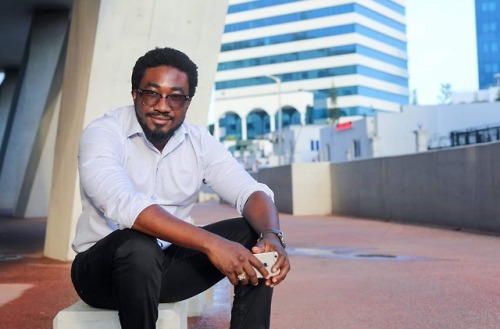
“I wanted to be a billionaire by the age of thirty. It was a literal goal. I wanted to be the African version of Bill Gates or Warren Buffett. My parents always told me to work hard, and the money will come. It just seemed like the prize you got for checking all the boxes. And I always checked the boxes. I made straight A’s. I went to Howard University. I worked at Goldman Sachs after graduating. The plan was to make money, build relationships, then return to Ghana and create some businesses. But my first business took too long to get off the ground. Then I got frustrated and poured all my savings into another business. Both of them were self-sustaining for a while, but it’s been a struggle since then. Right now I’m trying to raise more funds and it’s not going well. And I’m a far reach from where I wanted to be. My confidence is shaken. I’m unsure of my next step. And I’m approaching forty. I’m trying to manage the disappointment by changing my perspective. I try to remind myself that I have a beautiful wife and son. I’ve employed people. And I’ve had some great experiences. I no longer feel the need to be a billionaire. My new goal is to have a successful business that I can work at every day. But in the back of my mind, I keep wondering: ‘Am I developing a more realistic perspective? Or is this what quitting sounds like?’”
(Accra, Ghana)
October 14, 2018
“When I remember that December is coming, I get anxious. We...
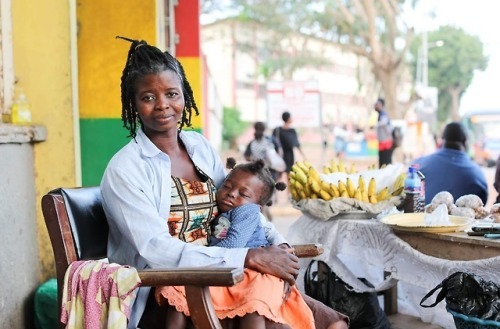
“When I remember that December is coming, I get anxious. We pay rent at the end of the year and we don’t have it. We’re saving all we can but we’re only halfway there. My husband sells kabobs but it’s not going well. I’m selling bananas to help out. My children are wearing torn school uniforms. I can only afford books for some of them. I prioritize by who will get in the least amount of trouble with their teachers. The smallest one doesn’t have any books right now, because I need the oldest one to get high marks. I don’t know what I’ll do if we get evicted. But I bounce back. I’m a happy person. And all of the shopkeepers around here are my friends. We keep each other distracted. We play jokes on each other. We make each other laugh. And we share what we have. Some of them are drivers, and if they drive out to the province, they’ll bring back food for me. So life can be good. Things are manageable. And I’m fine as long as I stay busy. I only withdraw when I remember the challenges I have.”
(Accra, Ghana)
Brandon Stanton's Blog
- Brandon Stanton's profile
- 769 followers



